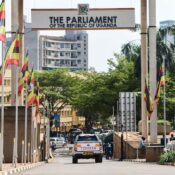
Early emails show that the US was worried about the Gaza assault and the possibility of Israeli war crimes
In October of last year, Israel attacked northern Gaza from the air and told more than a million Palestinians to leave the area. At the same time, a top Pentagon official gave the White House a direct warning.
In an email sent Oct. 13 to top aides to President Joe Biden, Dana Stroul, who was then the deputy assistant secretary of defense for the Middle East, said that the mass evacuation would be terrible for people and could be against international law, which could lead to war crime charges against Israel. She wrote that Stroul was telling her about a report from the International Committee of the Red Cross that made her “chilled to the bone.”
The Gaza war is getting close to its first anniversary, and the Middle East is on the verge of a bigger war. Stroul’s email and other communications that have not been made public before show that the Biden administration is struggling to balance its internal worries about rising deaths in Gaza with its public support for Jerusalem after the Oct. 7 Hamas attack on southern Israel that killed 1,200 people.
Reuters looked at three sets of emails from Oct. 11 to 14 that were sent between top U.S. government officials, just a few days into the situation. Fights in Gaza have killed more than 40,000 people and have led to protests in the U.S. led by Arab Americans and Muslim activists.
It was early on in the State Department and Pentagon that they were worried that a rising death toll in Gaza could break international law and hurt U.S. relations with the Arab world. These emails have not been made public before. The messages also show that the Biden administration is under pressure to change its message from showing support for Israel to showing support for the Palestinians and the need to let more relief aid into Gaza.
Even after months of U.S.-led talks, a peace deal is still not in sight. A lot of Gaza is now just a desert. And there is a chance of a war in the region with Iran after Israel attacked military targets in Lebanon and killed Hassan Nasrallah, the leader of the Iranian-backed Hezbollah group, last week.
Some of the top people in the Biden administration say they think that early White House pressure on Israeli Prime Minister Benjamin Netanyahu’s government made a difference and stopped an even worse disaster. Secret briefings from the administration at the time said that the White House asked Israel to delay its ground attack so that aid groups could get ready to help people who had to leave their homes and so that Israel would have more time to reach a deal with Hamas.
Three top U.S. officials who were involved in making the decision said that Washington took too long to do anything about the suffering of the Palestinians. The ground invasion was eventually put off by about 10 days, but the three sources said that it was more because the Israeli military was getting ready for operations than because of pressure from the United States.
When asked about the emails, the White House said, “The U.S. has been leading international efforts to get humanitarian aid into Gaza” and that “this is and will continue to be a top priority.” The White House also said that “there was no food, water, or medicine getting into Gaza before U.S. engagement.”
Following the Hamas attacks, both Israeli and Hamas leaders are being investigated for possible war crimes. In June, a U.N. commission found strong evidence that Hamas and other armed Palestinian groups had committed war crimes, such as torturing and holding hostages. The commission also found evidence of Israeli war crimes from the use of large explosives in Gaza in the early months of the war.
Democrats who support Israel and younger progressives who support Palestine are still strong groups that are putting pressure on the Biden administration and Kamala Harris’s presidential campaign. Former President Donald Trump, Harris’s Republican opponent, says he will “settle” the war “fast” if he wins the election in November, but he doesn’t say how. However, foreign policy experts say the election probably won’t have a big effect on U.S. policy toward Israel because both parties have long supported the country.
Reuters looked at a bunch of emails that show how quickly people in the Biden administration tried to warn the White House about the coming crisis and how the White House initially resisted a ceasefire in the early, chaotic days of the war. The first three sets of emails started on Oct. 11, which was Israel’s fifth day of air strikes after Hamas’s invasion.
“Losing our credibility”
Early on, the government became more worried about how the US was seen by its Arab allies.
After Israeli airstrikes hit hospitals, schools, and mosques in Gaza, Bill Russo, the top public diplomacy official at the U.S. State Department, told senior State officials that Washington was “losing credibility among Arab-speaking audiences” by not directly addressing the humanitarian crisis, according to an email from Oct. 11. On that day, about 1,200 people were killed in Gaza, according to the health authorities.
Israel said the strikes were necessary because Hamas was using civilian buildings for military purposes. Russo wrote that U.S. officials in the Middle East were keeping an eye on Arab media reports that Israel was committing “genocide” and that Washington was helping Israel commit war crimes.
Russo wrote, “The U.S.’s failure to respond to the humanitarian conditions for Palestinians is not only ineffective and counterproductive, but we are also being accused of possible war crimes by keeping quiet about Israel’s actions against civilians.”
At the time, rescue workers were fighting to find people buried under Israeli airstrikes’ debris, and the world’s attention was shifting from the killed Israelis to the civilians in Gaza who were being besieged.
In a speech to the leaders of the State Department, Russo urged them to quickly change the public position of the administration, which was to fully support Israel and its military operation in Gaza. “If this course is not quickly reversed by not only messaging but action, it risks damaging our stance in the region for years to come,” he wrote. Russo resigned in March for personal reasons, and he declined to comment.
Barbara Leaf, who is the top Middle East diplomat at the State Department, sent Russo’s email to White House officials, including Brett McGurk, who is Vice President Biden’s top adviser for Middle East affairs. She told them that Bush’s relationship with his “otherwise would-be stalwart” Arab allies was in danger because of Russo’s concerns.
If you asked McGurk if the administration should call for a ceasefire, he said “No.” But he did say that Washington was “100%” in favor of backing humanitarian corridors and keeping civilians safe.
For this story, McGurk and Leaf refused to say anything.
A look at public comments after Russo’s email shows that the U.S. public position didn’t change much over the next two days. U.S. officials kept stressing Israel’s right to defend itself and their plans to send military help to Jerusalem.
“Pump up the breaks”
As promised in Russo’s email, Israeli planes dropped leaflets over northern Gaza on Oct. 13 telling a million people to leave their homes. Netanyahu gave the people 24 hours to leave before Israeli troops with tanks attacked the Hamas-run territory of 2.3 million people. He promised to destroy Hamas for its attack.
It scared aid groups and the UN because Israel’s airstrikes had already destroyed whole neighborhoods. The International Committee of the Red Cross (ICRC) in Geneva said that Israel’s order was “not compatible with international humanitarian law” because it would cut off Gaza from food, water, and other basic needs. In a private phone conversation with Stroul that same day, ICRC Middle East director Fabrizio Carboni was more direct, as shown by emails.
“ICRC is not ready to say this in public, but is raising private alarm that Israel is close to committing war crimes,” Stroul wrote in her Oct. 13 email about the conversation. The email was sent to senior White House officials, including McGurk, as well as senior State and Pentagon officials. “Their main line is that it is impossible for one million civilians to move this quickly,” Stroul wrote. One U.S. official on the email chain said that such an evacuation could not happen without causing a “humanitarian catastrophe.”
When asked about Carboni’s call with Stroul, the ICRC said, “We regularly work with parties to armed conflicts and those who have a say in them to promote greater adherence to the laws of war in order to prevent civilian suffering during conflict. We believe that such conversations are strictly private.”
In public, the White House showed moderate support for Israel’s plans. A spokesperson for the White House told reporters that such a large evacuation was “tall order,” but that Washington would not second-guess Israel. U.S. Defense Secretary Lloyd Austin said that the United States would continue to send military aid to Israel.
Several senior U.S. officials told Reuters that they were worried there was no safe way out of Gaza, which was very crowded. Israel had put up a blockade, and Egypt, which is right next door, would not open its borders as part of a long-standing policy to stop a large-scale resettlement of Palestinians. Some Palestinians who tried to leave northern Gaza were killed when Israel bombed cars and trucks carrying them.
In an email response to Stroul, McGurk said that Washington might be able to get Israel to give the Palestinians more time to leave than 24 hours, saying that the administration “can buy some time.” However, he wrote that the Red Cross, the UN, and aid groups should work with Egypt and Israel to get ready for the departure.
This reminded McGurk of the U.S.-led military operation against Islamic State militants in Mosul from 2016 to 2017, which destroyed the Iraqi city. He said that the military and humanitarian strategy for that operation had been planned together. Two officials replied that it would be impossible to set up the necessary infrastructure in such short notice. One reminded McGurk that the Mosul operation was the result of much more planning, and that humanitarian groups had months to set up and help people who had to leave their homes.
As we see it, there’s no way for this many people to be forced to leave their homes without causing a humanitarian disaster, according to an email from Paula Tufro, a senior White House official in charge of humanitarian response. It would take “months” to set up the systems needed to give more than a million people “basic services.” She asked the White House to tell Israel to slow down its offensive.
“The Government of Israel (GOI) needs to shut down the flow of people south,” Tufro wrote.
At the time, Andrew Miller was the deputy assistant secretary for Near Eastern Affairs at the State Department. He told his coworkers to move quickly.
Miller wrote, “If we want to work with the Israelis to stop them from wanting mass evacuations, we will have to do it soon, at a high level, and at multiple touch points.” Miller quit in June for family reasons.
Netanyahu had a lot of freedom to attack Hamas after Biden spoke out about Gaza in public. At the time, Biden didn’t face many problems from the left wing of the Democratic Party because he supported Israel’s counterattack. Israel’s comparison of the Hamas attack to the attacks on New York and Washington on September 11, 2001, had a big impact on people in the U.S.
Around October 13, U.S. Secretary of State Antony Blinken spoke out for the first time in public about the “suffering of Palestinian families in Gaza” at a news conference in Doha. He said that Washington was in constant talks with Israel and aid groups to help civilians in Gaza.
The next day, Oct. 14, Biden changed his tone. In a speech, he said that he was giving the humanitarian crisis in Gaza top priority and told his team to help bring more aid into the war zone. It is not clear if the emails from Russo and others affected what Blinken and Biden said.
Israel sent infantry into Gaza on October 13, but the real attack didn’t start until October 27. At the time, people who knew about the situation said that Washington told Israel to wait, mostly to give time for talks to free Israeli hostages held by Hamas.
A State Department spokesperson told us that the U.S. has been clear from the start of the conflict that Israel has the right to defend itself, but how it does so is important. “Israel has a moral imperative to minimize the harm of its operations to civilians, something we have emphasized both publicly and privately,” the spokesperson said.
Stroul and Tuffro refused to say anything, but Miller said in a statement that the administration was “worried about the humanitarian implications of a mass evacuation.” He also said that “Israeli military plans were very inchoate at that stage, and we were trying to develop a better understanding” of these plans.
WEAPONS RATED UP
While U.S. officials looked into the humanitarian situation, Israel asked Washington for more weapons.
According to the emails, on October 14, a top official at the Israeli Embassy in Washington asked the State Department to speed up the delivery of 20,000 automatic weapons to the Israeli National Police.
In an Oct. 14 email to his State Department counterpart, Ori Katzav apologized for bothering her over the weekend, but said the shipment of rifles was “very urgent” and needed U.S. approval. Christine Minarich, who works in the Directorate of Defense Trade Controls at the State Department and approves arms sales, told Katzav that the rifles would not be approved in the next 24 to 48 hours. This is because large weapons shipments need to be approved by the State Department and Congress are informed.
Katzav and the Israeli Embassy both refused to say anything.
Jessica Lewis, who was assistant U.S. secretary for political and military affairs at the time, sent Minarich’s email and Israel’s request for the rifles to the Democracy, Labor, and Human Rights (DRL) bureau at the State Department. DRL checks potential U.S. weapon sales to make sure they don’t go to militaries that abuse human rights.
According to the emails, Lewis asked the bureau to speed up its study and “urgently” explain any objections to certain arms packages for Israel. Lewis quit in July.
Christopher Le Mon, who is the deputy assistant secretary at DRL, said that more than a dozen packages of weapons should be turned down. These packages included grenade launchers, gun parts, rifles, and spare rifle parts. In response to Lewis, he said that he was worried about the “conduct” of some Israeli National Police units, such as the elite Yamam border patrol unit.
It was written by Le Mon that Yamam was involved in “gross violations of human rights.” According to the email and a source familiar with the situation, DRL raised concerns about 16 different arms shipments for Israel. Despite these concerns, the source said that almost all of the shipments went through anyway. One of Yamam’s missions was to rescue four Israeli hostages on June 8, but Gaza health officials say that this killed more than 200 Palestinians.
The Israeli Embassy, Minarich, Le Mon, and Lewis all refused to say anything.
Since the start of the war in Gaza, the United States has sent a lot of weapons to Israel. These include thousands of Hellfire missiles and more than 10,000 highly destructive 2,000-pound bombs, according to two U.S. sources who were given an updated list of the weapons shipments.
Several U.S. officials who know about the situation say that since the Gaza war started, Washington has sent a lot of weapons to Israel. These include thousands of precision-guided missiles and 2,000-pound bombs that can destroy densely populated areas and have been used to destroy tunnels and bunkers.
Some rights groups say that civilian deaths were caused by the use of those weapons. For example, Amnesty International said that from October 10, 2018, to January 20, 2024, U.S.-supplied weapons killed civilians, including women and children, in “serious violations” of international humanitarian law. In July, it warned that this showed that the U.S. was involved in what it called Israel’s illegal use of U.S. weapons to commit war crimes, which the U.S. has denied.
A study from the State Department in May said that Israel may be breaking international law by using U.S. weapons, but that the report could not say for sure because of the chaos of war and the difficulty of gathering data.
There were claims that Israel had attacked civilians, but a spokesman for the Israeli Embassy said, “Israel is a democracy that follows international law.”
All Categories
Recent Posts
Tags
+13162306000
zoneyetu@yahoo.com



